AY2023 Publicity offered research
A04 Psychology research related to the mechanisms of brain and mind
A04-L201: Seamless daily cogntiive and physical interventions for older adults
Rui Nouchi (Associate Professor, Institute of Development, Aging and Cancer, Tohoku University)
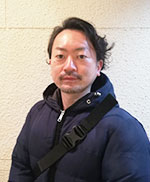
Several cognitive and physical intervention programs for cognitive health exist. However, many older adults do not use these intervention programs due to lack of time and a limitation of places. Therefore, this study aims to develop a new intervention program using VR systems and a daily intervention programs using daily acitivities and motions.

A04-L202: Conversations between older and younger adults: Resilience elucidation and cognitive modelling as a higher cognitive function
Etsuko T. Harada (Visiting Professor, Faculty of Human Sciences, University of Tsukuba)
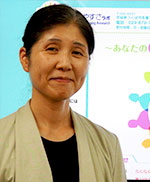
In the cognitive ageing research, language and world knowledge are considered as areas where there is little decline in healthy aging. However, in actual everyday lives, it is frequently observed that older people’s dialogue shows some kinds of differences or changes. Those are looked like not simple declines in simple functions, but a complex diversity. This study attempts to capture the manifestation of such changes in older adults’ dialogue within the framework of resilient properties of the system (Hollnagel, 2010). Resilient properties are “the ability to maintain the intended function to be achieved by responding flexibly to external disturbances”. We think the system of human cognition is basically considered to have highly resilient properties by nature. Especially language usage and its phenotypic form, conversation have highly resilient characteristics, thus subtle changes with ageing bring about various changes in dialogue, we suppose.
In previous years, we tried to examine resilient properties corresponding to cognitive changes with the ageing on the side of older people. This year, we will target intergenerational conversations between older and young adults. We hypothesize that 1) there are subtle changes on the part of the elderly speaking, 2) the younger adults who are the conversation partners resiliently change the form of the conversation in response to these changes, and 3) perceptible changes appear in the elderly’s conversation as a result. In this framework. We attempt to build and test a model of those changes in the intergenerational conversations between older people and young adults.
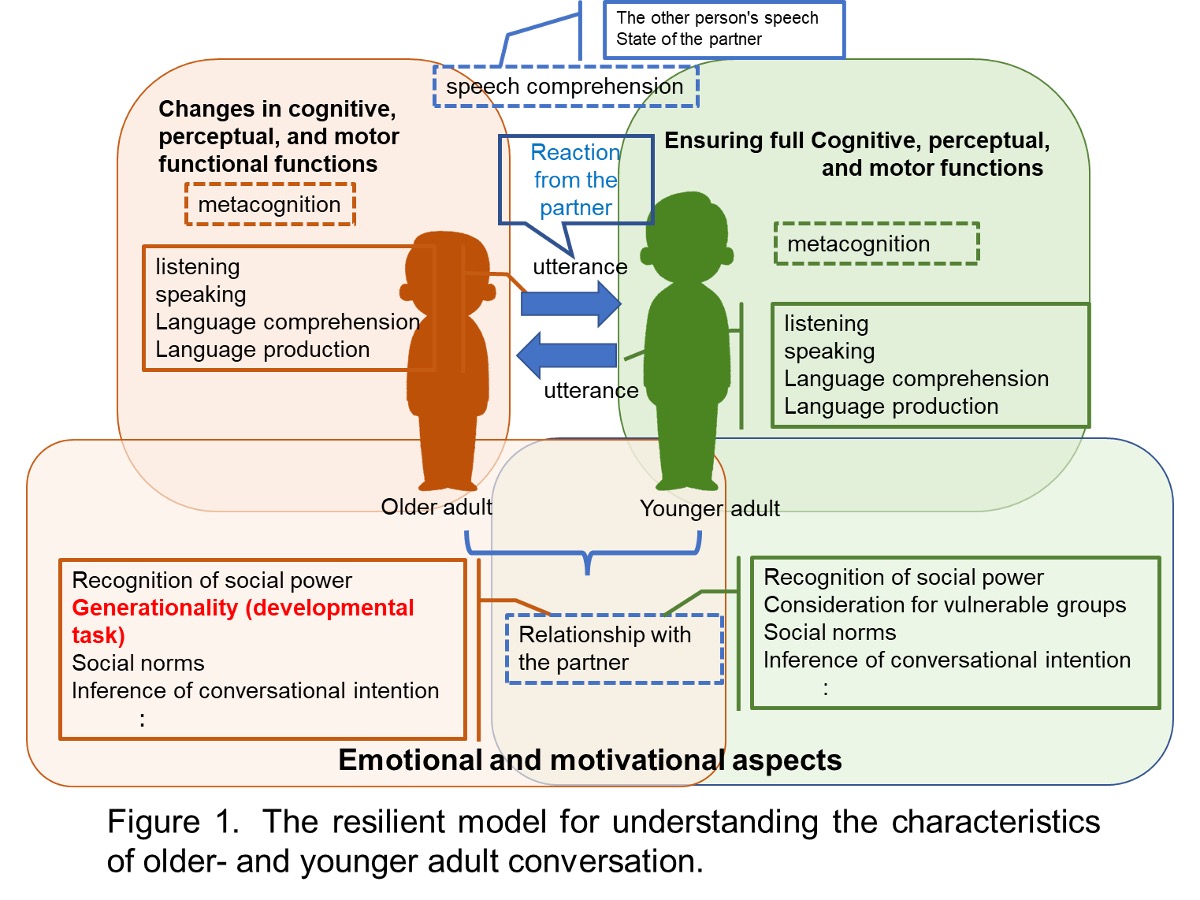
A04-L203: A proposal for the new brain imaging analysis method utilizing a large structural brain imaging dataset through the lifecourse
Shinsuke Koike (Associate Professor, Graduate School of Arts and Sciences, The University of Tokyo)
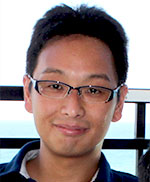
Magnetic resonance imaging (MRI) is now commonly used to analyze brain structure and function; however, it has become more difficult to start a new brain MRI study project, because of the following issues: a) small sample size, b) differences in measurement parameters and preprocessing methods, c) confirmation of validity and reliability, and d) nonlinear effects of age, gender, and other demographic factors. Here, we will conduct brain age gap (BAG) method from nonlinear developmental and aging data over the lifecourse from the previous project. In this dataset, 3,000 scans from the participants aged 10-80 years were used. Then, we will try to confirm the validity and reliability of MRI datasets with small sample sizes. As the detailed purposes, we will 1) expand and utilize existing large-scale BAG dataset, 2) develop techniques to combine large-scale BAG dataset with a new small-sample MRI data, 3) expand and utilize the sophisticated BAG dataset including multimodal new protocol data, and 4) conduct tutorials to enable young researchers to utilize these technics.
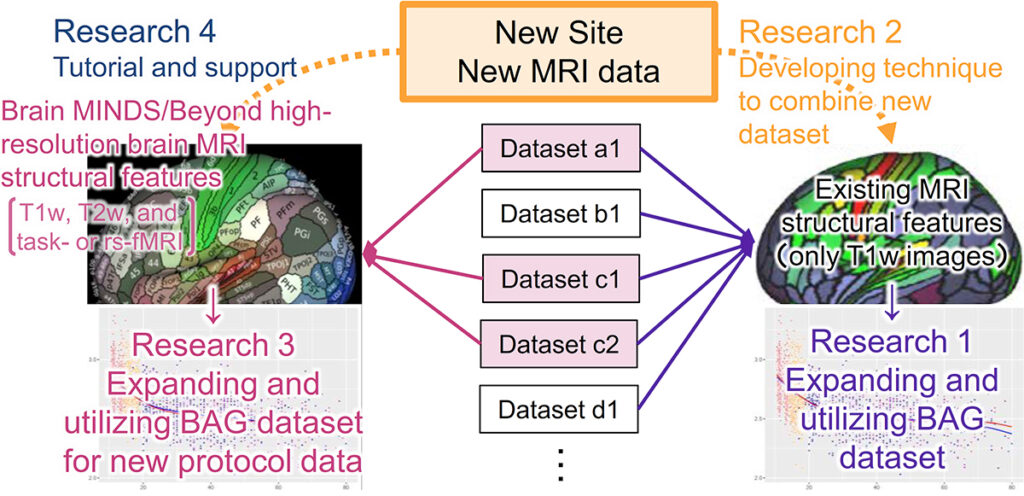
A04-L204: Examining the robustness of older adults’ advantages in intuitive trust across countries, experimental tasks, and analysis methods
Atsunobu Suzuki (Associate Professor, Graduate School of Humanities and Sociology, The University of Tokyo)
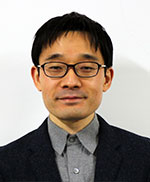
This project aims to examine the robustness of the research finding that older adults are superior to other adult generations (especially young adults) in “intuitive trust,” or intuitive judgments about the trustworthiness of others. People tend to make intuitive judgments about the trustworthiness of others based on perceptual cues such as faces and voices. We recently investigated age-related differences in such face-based intuitive trust and found “older adults’ advantages”: older adults were more accurate and less biased in these intuitive trustworthiness judgments than middle-aged and young adults (Suzuki, Ishikawa, and Okubo, 2022). This finding suggests an age-related improvement in a social cognitive domain. However, Suzuki et al. (2022) only examined Japanese faces and Japanese participants and used the simplest analysis based on signal detection theory. Therefore, it is unclear how robust the obtained results are to changes in various factors such as face images, participant populations, experimental tasks, and analysis methods. Thus, the present study aims to determine the robustness of older adults’ advantages in intuitive trust to variations in these factors. Professor Matia Okubo and Assistant Professor Kenta Ishikawa of Senshu University and JSPS Research Fellow Misako Kawahara will participate in this project as collaborators.
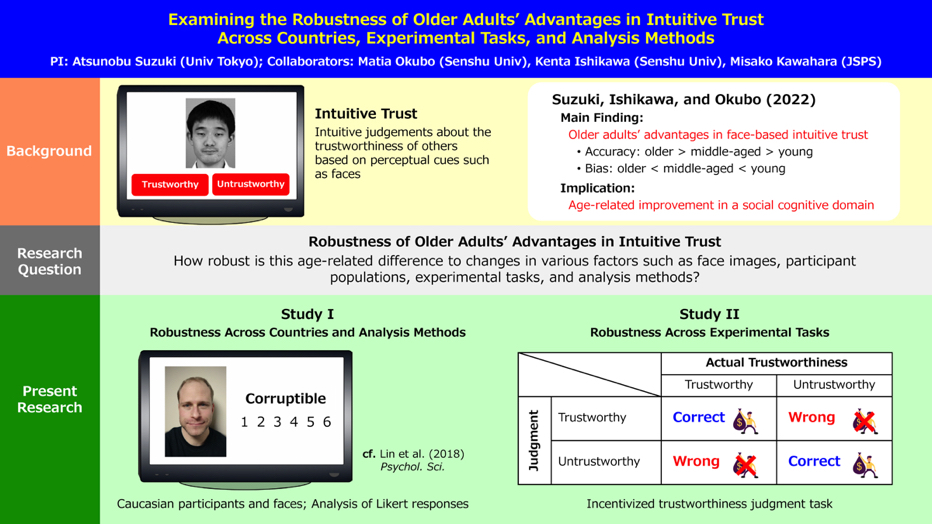
A04-L205: Precision aging research in neurodevelopmental disorders with a focus on epigenetic regulation
Ryo Kimura (Professor, United Graduate School of Child Development, Osaka University)

The purpose of this study is to elucidate the causes of individual differences in aging in neurodevelopmental disorders, combining gut microbiota on lifestyle changes with “biological age” using DNA methylation. In our previous studies, we found that accelerated “biological age” was associated with neurodevelopmental disorders including Williams syndrome. However, it is unclear why aging is accelerated in these neurodevelopmental disorders and why there are individual differences in the degree of aging. In addition, it is not yet clear how cognitive-behavioral characteristics change with accelerated aging.
Therefore, we aim to clarify the relationship between lifestyle and individual differences in aging by combining symptom assessment using questionnaires and wearable devices, gut microbiota composition, and “biological age”. The results of this study will contribute not only to the diet and exercise interventions for neurodevelopmental disorders, but also to the delaying of aging and ameliorating disease characteristics in the future.
A04-L206: Identification of the Molecular Biological Basis Underlying the Delay of Brain Aging Through Physical Health
Toru Ishihara (Assistant Professor, Graduate School of Human Development and Environment, Kobe University)

A healthy lifestyle that promotes physical health has been shown to be associated with a slower rate of brain aging. For example, improving physical fitness through regular exercise has been linked to a deceleration of brain aging in middle-aged and older adults. Conversely, excessive sedentary time, smoking, sleep deprivation, obesity, and hypertension have been associated with accelerated brain aging. What are the molecular biological mechanisms by which these physical health factors are related to brain aging? This study aims to investigate the molecular biological mechanisms by which physical health factors decelerate brain aging, with a focus on the role of DNA methylation. Specifically, we will examine the relationship between physical health indicators (past and current exercise habits, physical activity, sleep habits, smoking habits, body composition, obesity, muscle strength, etc.) and brain imaging data obtained using magnetic resonance imaging (brain volume, cortical myelin content, neurite density and orientation dispersion, structural and functional connectivity, etc.), and identify saliva DNA methylation markers that mediate these relationships. The findings of this study are expected to identify which physical health indicators are mediated by which DNA methylation markers and associated with brain aging. This could lead to the development of initiatives for providing effective lifestyle feedback for individual brain aging prevention based on saliva samples in the future.
A04-L207: Investigation of Menopausal Mother and Their Child-Related Concerns, and its Neural Basis: Toward the development of a Support System
Ayaka Ishii-Takahashi (Section Chief, Department of Developmental Disorders, National Institute of Mental Health, National Center of Neurology and Psychiatry)

An increasing number of women are giving birth after the age of 40, and caring children under the age of 12 whilst they go through menopause. However, very few studies internationally have examined the impact of menopause on raising children.
While some studies have identified the impact of children moving out of home and associated grief and loss experienced by parents (e.g. empty nest syndrome) in menopausal women, very few studies have examined the impact of menopause on raising children under 12 years of age. It has been identified that during menopause, the estrogen receptors distributed in the frontal lobe, thalamus, hypothalamus, amygdala, basal forebrain and posterior cingulate gyrus, lead to changes in the function and morphology of these regions. Such changes may be further associated with psychological symptoms and changes in cognitive function during menopause. Despite the fact that these brain regions are associated with emotions and attachment that affect child rearing, there are no reports on the neural basis of the impact of menopause on raising children. Therefore, the purpose of this study is to understand the current state of child rearing (under 12 years of age) for menopausal mothers, its impact on the brain neurobiology, and its effect on the formation of attachment between mother and child, and to develop a child rearing support system during menopause.
To this end, we will conduct interviews and brain imaging research using magnetic resonance imaging to understand the current state of menopausal mothers and their child-related concerns, and based on these results, we will construct a new support system centered on parent training for menopausal mothers. Parent training may be an effective support system for menopausal mothers because it provides practical strategies for positive parenting.
This study will focus on child-rearing during menopause (under 12 years of age) and its effects on the brain, which have not been previously examined., We aim to elucidate the biological mechanisms of attachment formation between mother and child, and develop support for child-rearing during menopause. We will examine not only the difficulties of raising children during menopause, but also the positive aspects of raising children in the 40s.
It is expected that the results of this research will not only promote the well-being of menopausal mothers and their children, but also promote awareness of the value to the society of post-menopausal mothers in raising children.
B03 Sociology research of individual lifestyles interacting with social environment
B03-L201: A Sociological Study on the Community Contribution Activities of the Elderly: Through the Analysis of Local Histories and Life Histories
Yoshinori Kasai (Associate Professor, Faculty of Sociology, Keio University)

Even in a shrinking and aging society, local communities have a certain degree of resilience. Here, the elderly are considered to contribute to that resiliency as active players in their local communities.
The purpose of this study is to analyze the lived experiences of the elderly, mainly in their mid-70s, from the perspective of their relationship with their local communities, and to determine how the community characteristics of each local community affect the activities of the elderly.
The uniqueness and creativity of this study is brought about by the social research methodology, in addition to the perspective that the lived experiences of the elderly can be utilized as a useful resource for future society. This study will employ a qualitative mixed social research method. In particular, interviews as a life history research can be adopted as an appropriate method when analyzing the lived experiences of the elderly. It is clear from previous studies that a high level of social analysis can be achieved by carefully interviewing the life of a single person or by combining many life histories, and this method will be employed in this study.
The study was inspired by the realization that the current elderly are still active in their communities because they have experienced community characteristics such as community and locality in their childhood and youth, and that they have prepared community-specific arrangements to create such experiences. The applicants call this “repertoire of a convivial society” from the point of view that local communities select from a number of possible methods, arrange and utilize these community-specific arrangements and mechanisms, and contribute to the conviviality of people with diverse values in the local community. In order for a community to be maintained while utilizing the repertoire of a convivial society, people’s values and lifestyles must be maintained, even if only partially, in the face of external changes, rather than immediately changing in response to such changes. Changes in external conditions include industrial structure, culture, social norms, and economic conditions.
In order to analyze the relationship between the community characteristics of the local community and the elderly people’s activities to contribute to the local community while paying attention to the diversity of such external conditions, this study deals with three types of communities: “traditional communities along old roads,” “new towns built in the 1970s,” and “old mining villages/now dairy farming and fishing villages.
C03 Cultural anthropology research of socio-cultural basis related to the diverse view of development and aging
C03-L201: A Case Study on the Lifelong Perspectives of an Intermediate Group in Close Physical Contact in Catalonia, Spain, a Super Aging Society
Yuko Iwase (Postdoctoral Fellow, Graduate School of Humanities, Tokyo Metropolitan University)

According to the Institute for Health Metrics and Evaluation (IHME) at the University of Washington, Spain is expected to have an average life expectancy of 85.8 years by 2040, surpassing Japan to become the world’s longest-living country. One of the regions in Spain with the highest life expectancy is Catalonia, a region with a strong independence movement, and a developed region with many mutually supportive intermediate groups linking the state and individuals. The principal researcher has been studying the ways of mutual understanding based on the various bodily sensations of the people who continue to build ‘human towers’ (Castells) through close physical contact during the Catalan festivals. In this study, we will investigate the relationship between this form of mutual understanding and daily social relations through fieldwork and participant observation, and clarify how continuous close physical contact influences the formation of people’s ‘view of life’. This project will promote joint research with the field of body movement science, which deals with physiological, biomechanical and psychological principles and mechanisms of movement, through the elucidation of ‘views of life’ in ‘intermediate groups characterised by physical contact’, which tend to be avoided due to the influence of the COVID-19, and will also promote the Contribute to the ‘realisation of a flexible and diverse super-aged society based on a pluralistic view of life’, which is promoted by this research field.

C03-L202: An Anthropological Study of Maturing and Regenerating Craftsman’s Work: A Case Study of the Linkage of People, Objects, and Environment in the Textile Manufacturing
Tomoko Niwa (Associate Professor, Professional Institute of International Fashion)

In today’s society, science and technology are developing and becoming universal, and the computerization (externalization and automation) of physical and intellectual labor is accelerating. Under such circumstances, we are forced to rethink “what it is to be human” and renew our existing views of labor and life.
In addition, in recent years, the textile and fashion industry has been shifting to sustainable fashion and a circular economy in response to global environmental problems and labor exploitation in the global economy. In these times of transformation, what inspiring meaning can we take from the experience of “craftsmanship” in which people make things by hand, spending time and effort to learn and mature their skills and knowledge?
In this study, we will conduct an anthropological survey of innovative examples of craftsmen’s work, mainly in the textile industries in Japan and abroad, and consider the intersections and linkages between people, various tools and machines, and the environment.
This project will depict the developmental changes in the “life of craftsman” as they become skilled, the “life of materials and tools” such as plants and organisms used for dyeing and weaving, new and old looms, and the “life of the region and natural environment” that support the industry, by considering craftsman’s work as the node of a multidimensional ecosystem. We will examine the process of intertwining these lives, “maturing” with their own timelines and ways, requiring repairs as they age, and “regenerating” to be handed down to the next generation and sustained.
E01 Interdisciplinary research
E01-L201: Development of Palliative Care Nursing to Support Cancer Survivorship in the Elderly with Dementia
Sayuri Sakai (Professor, Graduate School of Health Sciences, Niigata University)
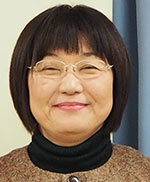
It is estimated that one out of every two Japanese will be afflicted with cancer and that the prevalence of dementia will be approximately 7 million. Nursing care in the super-aging society must transcend conventional concepts and reinforce a perspective that captures the continuity and lifelong development of the subject. This research plan is entitled “Development of Palliative Care Nursing to Support Cancer Survivorship in the Elderly with Dementia: Toward a Society Where Patients Can Live a Rich Lifetime without Cancer Treatment,” and is based on the actual situation of palliative care for the elderly with dementia and cancer (those who choose not to receive treatment for cancer), using anonymous medical information and other relevant data, The study is a retrospective study using anonymous medical data, questionnaires, and interviews. We believe that even in old age due to diseases such as dementia and cancer or superannuation, by adjusting environmental factors, human beings can achieve lifelong development that repeats various growth and transformation until the end of life, and inherit something that transcends generations. This study will clarify the actual situation of palliative care as an environmental factor both qualitatively and quantitatively, and create a lifelong view in which humans continue to develop until the end of their lives.
E01-L202: A study on the lives of people in East and Southeast Asia from the perspective of folklore archaeology and ethnoarchaeology
Atsushi Matsunaga (Assistant Professor, Kanazawa University Museum)

Human life changes in various ways through interactions with society and can also change with the times. To truly understand the nature of human life, it is necessary to understand not only the lives of contemporary people but also the lives of people in the past, such as the subjects of archaeology.
In general archaeology, however, the relics studied are static objects and lack the specific dynamic images of human life. This is supplemented by folklore archaeology and ethnoarchaeology, which are closely related to cultural anthropology.
Therefore, this study aims to clarify the similarities and differences between past and contemporary views of life from the perspective of folklore archaeology and ethnoarchaeology, and then to elucidate it from a social and cultural point of view.
To achieve a more realistic reconstruction of the lives of people in the past, it is necessary to conduct archaeological research that actively introduces folkloric and ethnographic research. Specifically, I will conduct (1) archaeological relic research and (2) folkloric and ethnographic research in a two-year plan, and integrate the results from a folklore archaeological and ethnoarchaeological perspective, elucidate views of life and its evolution from prehistory to the contemporary in East Asia and Southeast Asia.
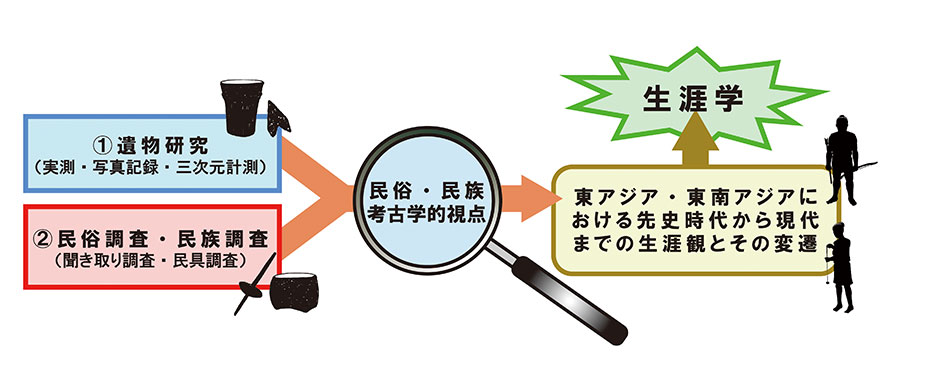
E01-L203: How do the elderly live in their society of wild chimpanzees?: Reviewed by behavioral observation and demographic data
Takuya Matsumoto (Assistant Professor, Faculty of Science, Shinshu University)
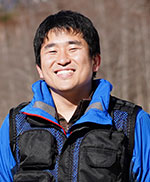
Menopause and longevity are features of human life history. Long-term field studies of wild chimpanzees, the most genetically related to humans, have revealed the presence of older individuals in their society. This research theme aims to clarify the social roles of elderly chimpanzees both for females and males, targeting wild chimpanzees in the Mahale Mountains National Park, Tanzania, where research has been ongoing for more than 55 years. We will behaviorally examine (1) whether elderly females support their daughters in raising children (testing the “grandmother hypothesis”) and (2) whether elderly males selectively share hunted meat to their own children and grandchildren (elucidating the roles of elderly males). In addition, we will investigate whether older chimpanzees contribute to increased inclusive fitness, using demographic data over the 55 years.This study will highlight the elderly life of chimpanzee, not as “the ones who just become weak” discussed in conventional wildlife researches, but as “the ones who interact with and support their society” for the first time. Through academic exchanges with researchers in this field of “Lifelong Sciences,” who promote cultural anthropological and psychological research mainly on homo sapiens, we would like to offer a new methodology; interspecies comparison of phenomena and the introduction of biological evolutionary perspectives.
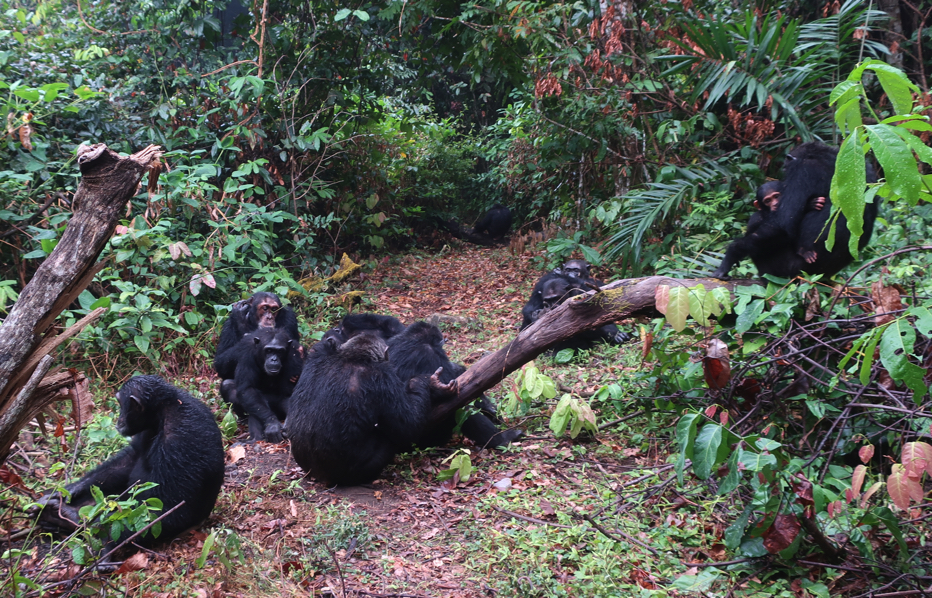
E01-L204: Metaverse where everyone can walk and communicate freely regardless of age
Michiteru Kitazaki (Professor, Department of Computer Science and Engineering, Toyohashi University of Technology)
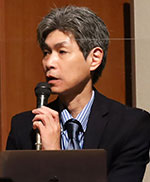
The ability to move freely based on one’s own will is of great significance to both physical and psychological health for individuals. However, as individuals enter into old age, their leg and back musculature undergoes a weakening process, and their equilibrium function (vestibular sensation) deteriorates. Consequently, motor commands and limb movements are not synchronous, resulting in difficulty in walking. This, in turn, has a detrimental effect on the physical and mental health of the elderly. The primary purpose of this study is to accomplish unrestricted and flexible walking that goes beyond age, environment, and physical ability by utilizing virtual reality (VR) and the metaverse. This research also aims to investigate the health implications of such walking on the mind and body, while constructing and assessing an environment that enables communication among multiple individuals. Rather than attempting to restore or magnify the physical functions of the elderly concerning walking, we acknowledge the physical body as it is, and simultaneously amplify self-efficacy through virtual walking in an alternative body using VR and the metaverse. Furthermore, the metaverse will provide the elderly with novel communication abilities and an environment that aims to reduce loneliness.
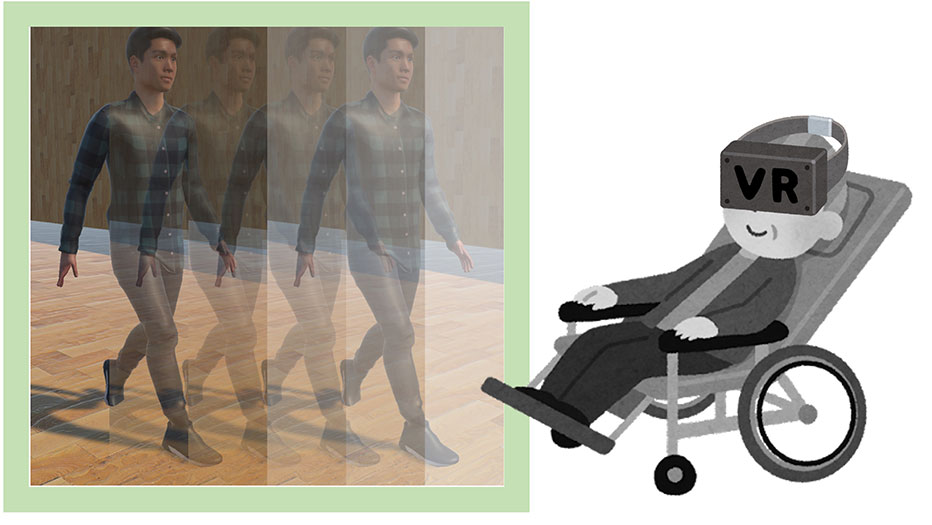
E01-L205: Definition of elderly based on the modification of resilience during aging
Hiroshi Kondoh (Associate Professor, Graduate School of Medicine, Kyoto University)

“Compromised resilience in aging” is one of prominent features observed in aging society, which is attracting more attention in lifelong science as a possible cause of aging-relevant diseases (frailty and others). We are engaged in research for glycolytic metabolism and metabolites from the viewpoint of “aging and metabolism”. Recently, we have noticed aberrant metabolic profiles are coupled with the changes in aging resilience.
The purpose of this project is to elucidate the mechanism of metabolically-changed resilience associated with aging. We have been studying the link between the glycolytic enzyme phosphoglycerate mutase PGAM and aging. Glycolytic metabolism is particularly enhanced in inflammation and cancers. However, like other glycolytic enzymes, PGAM is vitally essential for growth. Inhibitors against its enzyme activity have not been applied to practical use. We identified the “non-enzymatic activity” of PGAM.
Metabolome joint research was also initiated with Professor Mitsuhiro Yanagida of the Okinawa Institute of Science and Technology Graduate University. We developed our own human whole blood metabolome analysis method and vigorously identified and reported aging-related metabolites (aging, starvation, frailty/sarcopenia, dementia). Based on these seeds, we aim to create a new health concept of “health maintenance by repairing compromised resilience in elderly”.
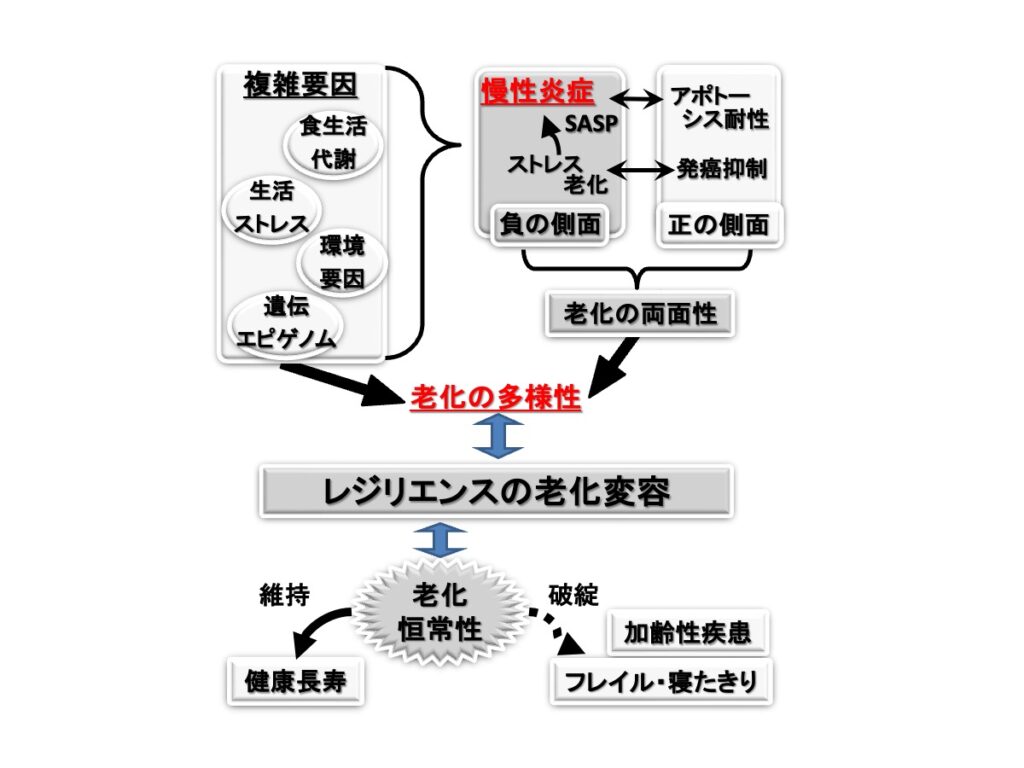
E01-L206: The association between perimenopausal iron deficiency and mental illness: Exploration for a female preventive medicine without resisting the decline of estrogen
Miho Egawa (Assistant professor, Department of Gynecoloty and Obstetrics, Kyoto University Graduate School of Medicine)

It is generally accepted that the main causes of the mental health problems of perimenopausal women, during the decade before and after menopause around the age of 50, are the estrogen-deficiency and the psychological stresses. On the other hand, the issue of iron deficiency in women who have been menstruating for approximately 40 years since their menarche up to menopause is often overlooked, and the causal relationship of various mental and physical menopausal symptoms and qualitative nutrient deficiencies, including iron deficiency, has not been widely investigated.
In this study, we will examine menopausal symptoms, mental illness, and lifestyle diseases among women during the perimenopausal period using the field of a population-based health checkup project. By measuring various additional nutrient biomarkers, we will cross-sectionally examine the association between physical characteristics, including nutritional status, and lifestyle habits and menopausal symptoms.
Additionally, we will collect individual daily symptoms and behavioral data using a smartphone application equipped with a patient-reported outcome (PRO) recording function. By analyzing the accumulated data and health checkup data using AI algorithms based on machine learning and deep learning, we aim to develop effective personalized lifestyle interventions.
Through these efforts, we would like to build the basis of evidence to propose “self-directed women’s healthcare methods,” which will enable women living in the era of 100 years of life to achieve self-fulfillment throughout their lives.
E01-L207: Digital detection of pre-symptomatic illnesses at home
Haruhiko Banno (Associate Professor, Institute for Advanced Clinical and Translational Sciences, Kyoto University Hospital)

It is predicted that approximately seven million people in Japan (about one in five older individuals) will suffer from dementia in 2025 (Source: Ministry of Health, Labour and Welfare, Annual Report on the Aging Society, 2009). Most dementia cases (60–80%) are caused by Alzheimer’s disease. Recently, the efficacy of antibody-based therapy against amyloid β-protein, the culprit protein of Alzheimer’s disease, has become evident. In the future, treatment options for Alzheimer’s disease are expected to change dramatically. Owing to the increasing percentage of unmarried individuals, many Japanese adults live alone and tend to neglect hospital visits. Hence, preventive medical intervention is the future direction, and home-based illness detection devices will become necessities of life. To that end, development of digital biomarkers that enable early diagnosis and intervention will be important to detect pre-symptomatic diseases.
Although many digital biomarkers have been proposed to detect dementia, none have been established as the gold standard. Therefore, a novel method that detects abnormalities at home may make disease prevention easier.
This study aims to identify digital biomarkers to detect unwellness such as mild cognitive impairment using digital devices. Furthermore, we will search for digital biomarkers that correspond to subjective unwellness.
Specifically, we will collect digital data from older individuals at home who are subjectively healthy using various devices, such as a magnetic sensor finger-tapping device (finger tap) and wearable activity meter. Moreover, we will collect the subjective mental and physical parameters of the study participants using a questionnaire. We will identify candidate digital biomarkers associated with mild cognitive impairment by comparing the data of healthy volunteers and patients with autosomal dominant familial Alzheimer’s disease, which have already been obtained. Consequently, we will develop a home-based digital biomarker to detect mild cognitive impairment and other pre-symptomatic diseases.
The results of this study will not only lead to the prevention of illnesses but also have the potential to elucidate the potential mechanisms of unwellness prior to symptom onset.
E01-L208: Establishment of a Large-Scale Harmonized Database for Validation of Models of Aging
Yasuyuki Gondo (Professor, Graduate School of Human Sciences, Osaka University)

Aging is a long-term continuous change that occurs with complex interactions among the three domains: physical/biological, cognitive/emotional, and social/environmental. Therefore, in order to understand the aging process in humans, it is necessary to evaluate these three domains simultaneously over a longer-term and to elucidate the relationship between the domains and their mutual effects and changes.
This study aims to expand a data harmonization method that enables data from different longitudinal surveys to be able to analyzed within the same framework, which has been conducted in the first phase of the lifelong science grant. Three main projects will be examined. First, developing a new method to evaluate cognitive function based on response patterns to questions using existing data. Secondly, identifying weight parameters for the emotion and well-being dimensions using the IRT. Finally, the results will be applied to the longitudinal survey data, for which data collection has already been completed, to validate a comprehensive model of the aging process. Furthermore, the results obtained from this study will be used to develop a standard set of items that can be used in the future studies.
This study will consist of three projects to be conducted in parallel over a two-year period.
Project 1 will extend the harmonization work of the NILS-LSA and SONIC longitudinal data. In the first phase grant, we focused exclusively on the cognitive/emotional and life context, the harmonization of the physical/biological (visual/hearing function, physical function, and biochemical indicators) and social domains (family and community assessment) will be pursued and the methodology will be transferred to Projects 2 and 3.
Project 2 will develop a methodology for estimating cognitive function from response patterns to questionnaires, using data already collected by the applicant and publicly shared data. Some of these surveys are also simultaneously assessing cognitive function, so that validity can be examined using the estimates obtained from response patterns and actual measurements of cognitive function.
Project 3 will use the harmonized data from this study to construct a standardized set of questions to assess the set of variables of the physical/biological, cognitive/emotional, and social/environmental domains. Even if similar concepts are measured across multiple studies, it is difficult to cross-reference them because of subtle differences in the questions. In this study, we will collect a representative set of questions used in the domains of well-being, mental health, depression, and positive and negative emotions, and conduct web and face-to-face surveys to calculate weighting parameters for each item.
In recent years, not only aging but also time to death has been attracting attention as a factor that influences an individual’s cognitive function and psychological state. Therefore, in parallel with these projects, a transcription survey of existing survey participants will be conducted to enable an analysis of the time from the time of measurement to death, identification of the date of death, etc.
E01-L209: An Analysis of Science Fiction’s Implications for Future Views of Development and Aging
Hirotaka Osawa (Associate Professor, Faculty of Science and Technology, Keio University)

This study analyzes how science fiction (SF), which has depicted the relationship between science, technology, and society, has depicted and conveyed changes in people’s views on development and aging in line with technological development and social change, and examines how the results of this analysis can be used in the future. The imaginative power of science fiction is an important component of our contemporary society and a driving factor in our vision of the future. The influence of science fiction has been particularly significant in new technological fields that have the power to support people’s lives and change their lifestyles. There are many technological terms derived from or influenced by science fiction, including wearable and automated machine technologies such as cyborgs and robots (robotics), information processing technologies seen in the field of artificial intelligence (Singularity), medical technologies such as genetic improvement and cloning, and communication technologies such as metaverse and cyberspace, have influenced the creation of visions of a society in which people are living longer and the elderly are assisted by technology. This study will analyze these literary and science fiction imaginings of future societies, such as how the introduction of technology into a super-aging society will change interpersonal relationships and views of life and death, from existing science fiction works. At the same time, the researcher will work with writers to create a vision of the future based on the findings of current life-long studies through SF prototyping.
For this purpose, two goals will be set.
A) Survey: Investigation of developmental and aging perspectives in fiction and evaluation of their impact on reality.
B) Design: Explore new views of development and aging through science fiction prototyping.
In A goal, the researcher will examine the history of people’s imagination, including their expectations and fears about artificial intelligence technology, and the role that fiction has played in society through a survey of past literature, interviews, and discussions with technologists, humanities specialists, and literary scholars. In B goal, several visions of the future envisioned by the implementation of science and technology, including artificial intelligence, will be conducted as science fiction prototyping to create a vision of development and aging in a super-aging society through the process of creating a science fiction work rather than an existing science fiction work based on the results of the survey. Through both a survey project that traces the history of the term and a design fiction project that embodies and communicates the new vision of the future envisioned as a result of the survey, a design theory for a future society based on people’s imagination will be created and shared with society.
E01-L2010: Informal learning through peer-support groups to increase resilience of people with visual and hearing impairments
Takahiro Miura (Senior researcher, Human Augmentation Research Center (HARC), National Institute of Advanced Industrial Science and Technology (AIST))
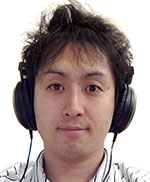
Over half of the visually- and hearing-impaired population in Japan consists of older adults. Because their sensory experiences and ADL (Activity of daily living) training situations vary widely, it is hard to develop typical lifelong learning schemes and support measures. We have investigated the coping experiences and needs of each disability situation and have found that the contribution of the support and peer-support groups is essential for their independent living. While the support strategies and know-how of these groups have not yet been clarified, the clarification of this point can be applied to lifelong learning and social education for people with disabilities. Therefore, this study aims to investigate the factors that support people with congenital and acquired visual and hearing impairments, and to establish a methodology for lifelong learning based on this support scheme. We will conduct the following three research topics.
1) Case studies of groups supporting people with visual and hearing impairments:
First, we conduct interview surveys with organizations that support people with visual and hearing impairments. The survey will be designed within a multiple-case holistic case study framework using a focus group interview method. Next, based on the results of the survey, a questionnaire study is conducted with other groups not included in the interviews and with persons with disabilities who were involved in these groups.
2) Analysis of factors that maintain or improve resilience:
We compare the interview results obtained in Study 1) and conventional literature to analyze the factors maintaining and improving resilience. In particular, by reviewing the coded tags of interviews related to resilience factors, we organize the resilience factors derived from the activities of individuals and those derived through the mediation of peer-support and support groups.
3) Proposal of informal/formal learning strategies for inclusive lifelong learning:
Considering the results of tasks 1) and 2), we try to construct a workshop on resilience factors as a place for informal learning that can serve as a foundation for inclusive lifelong learning for people with visual and hearing impairments. Then, we summarize learning strategies for inclusive lifelong learning based on the results of this study.
